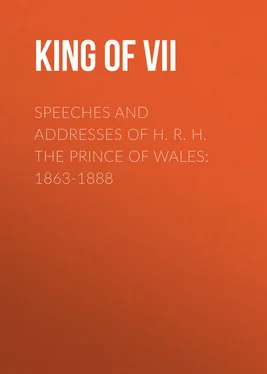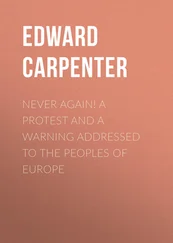Edward VII - Speeches and Addresses of H. R. H. the Prince of Wales - 1863-1888
Здесь есть возможность читать онлайн «Edward VII - Speeches and Addresses of H. R. H. the Prince of Wales - 1863-1888» — ознакомительный отрывок электронной книги совершенно бесплатно, а после прочтения отрывка купить полную версию. В некоторых случаях можно слушать аудио, скачать через торрент в формате fb2 и присутствует краткое содержание. Жанр: История, История, foreign_antique, foreign_prose, на английском языке. Описание произведения, (предисловие) а так же отзывы посетителей доступны на портале библиотеки ЛибКат.
- Название:Speeches and Addresses of H. R. H. the Prince of Wales: 1863-1888
- Автор:
- Жанр:
- Год:неизвестен
- ISBN:нет данных
- Рейтинг книги:3 / 5. Голосов: 1
-
Избранное:Добавить в избранное
- Отзывы:
-
Ваша оценка:
- 60
- 1
- 2
- 3
- 4
- 5
Speeches and Addresses of H. R. H. the Prince of Wales: 1863-1888: краткое содержание, описание и аннотация
Предлагаем к чтению аннотацию, описание, краткое содержание или предисловие (зависит от того, что написал сам автор книги «Speeches and Addresses of H. R. H. the Prince of Wales: 1863-1888»). Если вы не нашли необходимую информацию о книге — напишите в комментариях, мы постараемся отыскать её.
Speeches and Addresses of H. R. H. the Prince of Wales: 1863-1888 — читать онлайн ознакомительный отрывок
Ниже представлен текст книги, разбитый по страницам. Система сохранения места последней прочитанной страницы, позволяет с удобством читать онлайн бесплатно книгу «Speeches and Addresses of H. R. H. the Prince of Wales: 1863-1888», без необходимости каждый раз заново искать на чём Вы остановились. Поставьте закладку, и сможете в любой момент перейти на страницу, на которой закончили чтение.
Интервал:
Закладка:
King of Great Britain Edward VII
Speeches and Addresses of H. R. H. the Prince of Wales: 1863-1888
PREFACE
The year 1888, that of the Silver Wedding of the Prince and Princess of Wales, is also the 25th anniversary of the year when the Prince first began to appear in public life. It is, therefore, a fit time to present some record of events in which His Royal Highness has taken part, and of services rendered by him to the nation, during the past quarter of a century. The best and the least formal way of doing this seemed to be the reproduction of his Speeches and Addresses, along with some account of the occasions when they were delivered.
Some of these speeches, in more recent years, are known to all, and their importance is universally recognised; such as those relating to the various International Exhibitions, the foundation of the Royal College of Music, and the establishment of the Imperial Institute. But throughout the whole of the twenty-five years, there has been a succession of speeches, on all manner of occasions, of many of which there is no adequate record or remembrance. It is only due to the Prince to recall the various services thus rendered by him, especially during those earlier years when the loss of the Prince Consort was most deeply felt, and when the Queen, whose Jubilee has been so splendidly celebrated, was living in retirement. A new generation has come on the stage since those days, and there are comparatively few who remember the number and variety of occasions upon which Royalty was worthily represented by the Prince of Wales, and the important and arduous duties voluntarily and cheerfully undertaken by him.
Before carrying out this design, it was advisable to ascertain if there might be any objection on the part of the Prince of Wales. There might, for instance, be a purpose of official publication of these speeches. On the matter being referred to the Prince, he not only made no objection, but, in most kind and gracious terms, gave his sanction to the work, and hoped it might be "useful to the various objects which he had publicly advocated and supported."
The number and diversity of occasions on which the Prince has made these public appearances will surprise those who have not personal recollection of them. The speeches themselves will surprise no one. The Prince has had education and culture such as few of any station obtain; directed at first by such a father as the Prince Consort, and by tutors who carried out the design of both his parents. Accomplished in Art, and interested in Science, in Antiquities, and most branches of learning; with some University training at Oxford, Cambridge, and Edinburgh, and with his mind enlarged by foreign travel, we might expect the fruits of such training to appear in his public addresses. Add to this the kindliness which comes from a good natural disposition, the sympathetic influence of a genial manner, and the grace which is given by a training from childhood in the highest station, and we can understand how the speeches even of the earliest years were heard with pleasure and approval. Some of the speeches are very brief, but are always to the point, and present the gist of the subject in hand. It was Earl Granville who once said, in proposing his health, that, "if the speeches of His Royal Highness were usually short, they were always, to use a homely expression, as full of meat as an egg." Even where there has been no formal speech, we are interested in knowing what the Prince has done as well as what he has said; and therefore some important occasions are included when no speech was made.
It is the variety of subjects that will strike most readers. Let it be noted, moreover, that the speeches now reproduced are only those addressed to meetings where reporters for the press were present. There have been innumerable meetings besides, – meetings of Commissions, of Boards, of Councils, of Committees, at none of which has the Prince ever been an inactive or silent member, but rather the guiding and moving spirit. If the voluntary offices of His Royal Highness were printed at length, they would far outnumber those mere honorary titles with which the College of Arms concerns itself; and are such as imply thought and work, in many useful and beneficent ways.
Long may His Royal Highness have the health and the will for such offices and duties. If his future career is equal to the hopes and promise of his early life, and the performances 1 1 The frontispiece portrait, under which the Prince of Wales has been pleased to put his autograph, is etched by W. Strang, from a recent photograph by Van der Weyde
of the last twenty-five years, he will leave a name illustrious and memorable in the history of the British Empire.
THE EARLY YEARS OF THE PRINCE OF WALES
As the record of Public Speeches in the following pages does not begin till 1863, it may be well to give a few dates and incidents of previous years in the life of the Prince of Wales.
He was born on the 9th of November, 1841, at Buckingham Palace. From Windsor, to which the Court removed on the 6th of December, the Queen wrote next day to King Leopold, "We arrived here safe and sound, with our awfully large nursery establishment, yesterday morning… I wonder very much whom our little boy will be like. You will understand how fervent are my prayers, and I am sure everybody's must be, to see him resemble his father in every respect, both in body and mind."
The Prince, named Albert Edward, was baptized in St. George's Chapel, Windsor, on the 25th of January, 1842. King Frederick William of Prussia was invited to be the boy's Godfather, and he came over personally to undertake the office. The other Sponsors, six in number, were members of the Houses of Saxe-Coburg and Saxe-Gotha, and of the English Royal family. There was a full choral service at the christening. A special anthem had been composed by Sir George Elvey. On the Prince Consort being told of this, and asked when it should be sung, he answered, "Not at all; no anthem. If the service ends by an anthem we shall all go out criticising the music. We will have something we all know – something in which we can all join – something devotional. The Hallelujah Chorus; we shall all join in that, with our hearts." The Hallelujah Chorus ended the service accordingly. The incident is noteworthy, as showing how the infant Prince was committed, at his baptism, not in outward form only, but in devout spirit, to the care of the Heavenly Father.
When the Queen told King Leopold of the removal of the Court to Windsor, she had made special mention of "the nursery establishment." No mother in any rank of life ever paid greater attention to this part of the home, wherever the Court might be. In Memoirs and Recollections of the Queen, by those who have belonged to her household, many anecdotes are found which show the watchful care and the personal superintendence of the Royal Mother.
It is only this year, in the autumn of 1888, that Mrs. Hull, who entered Her Majesty's service as nurse to the Prince of Wales, died, in her seventy-ninth year. She was a kind and conscientious attendant to every one of the Royal children, and the Queen ever retained great regard for the faithful nurse – "Dear old May," as she used to call her. When she retired from the Royal service, and lived in recent years in Windsor, she was always welcome at the Castle. The Queen herself and the Princesses often saw her, and the Prince of Wales frequently brought her handsome presents. In reading the account of her funeral, it is pleasant to see that on the card attached to one of the many wreaths laid on her coffin were the words: "A mark of affection and gratitude from Victoria R. I." A beautiful wreath sent by the Prince and Princess of Wales bore the inscription: "In remembrance of dear old May."
Читать дальшеИнтервал:
Закладка:
Похожие книги на «Speeches and Addresses of H. R. H. the Prince of Wales: 1863-1888»
Представляем Вашему вниманию похожие книги на «Speeches and Addresses of H. R. H. the Prince of Wales: 1863-1888» списком для выбора. Мы отобрали схожую по названию и смыслу литературу в надежде предоставить читателям больше вариантов отыскать новые, интересные, ещё непрочитанные произведения.
Обсуждение, отзывы о книге «Speeches and Addresses of H. R. H. the Prince of Wales: 1863-1888» и просто собственные мнения читателей. Оставьте ваши комментарии, напишите, что Вы думаете о произведении, его смысле или главных героях. Укажите что конкретно понравилось, а что нет, и почему Вы так считаете.












